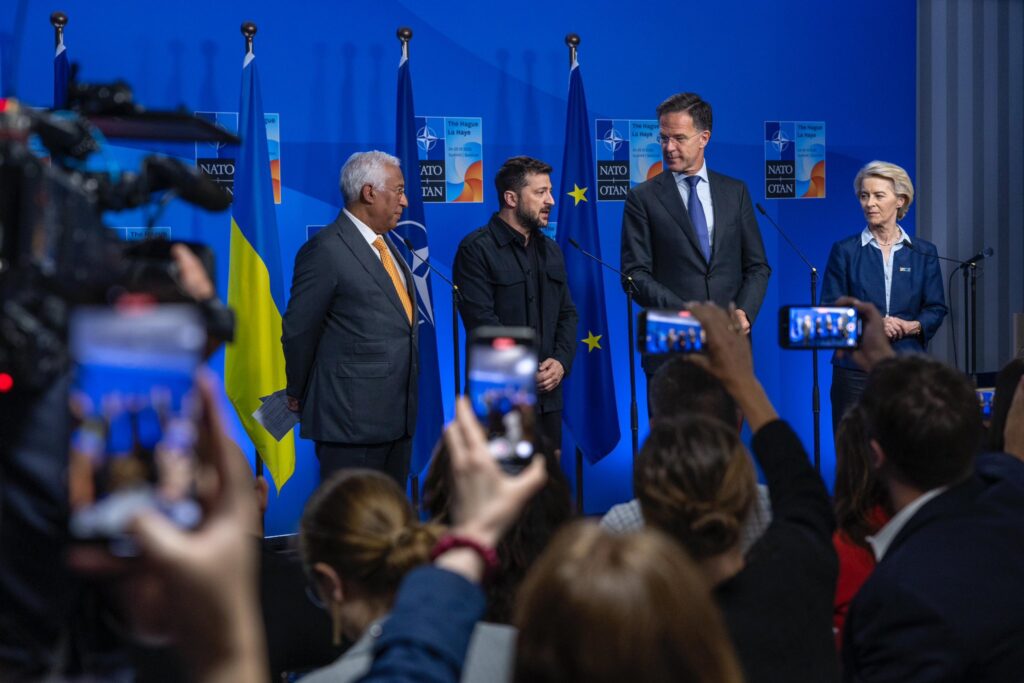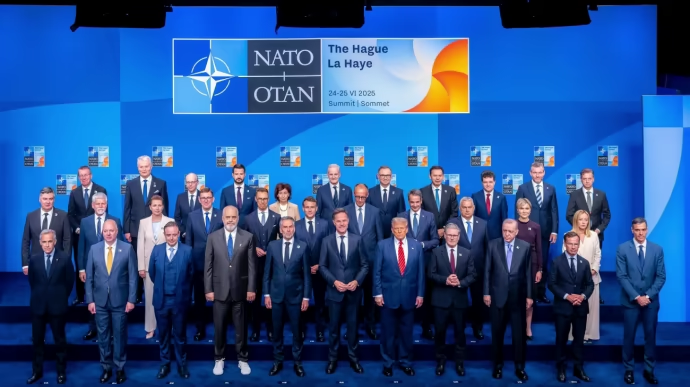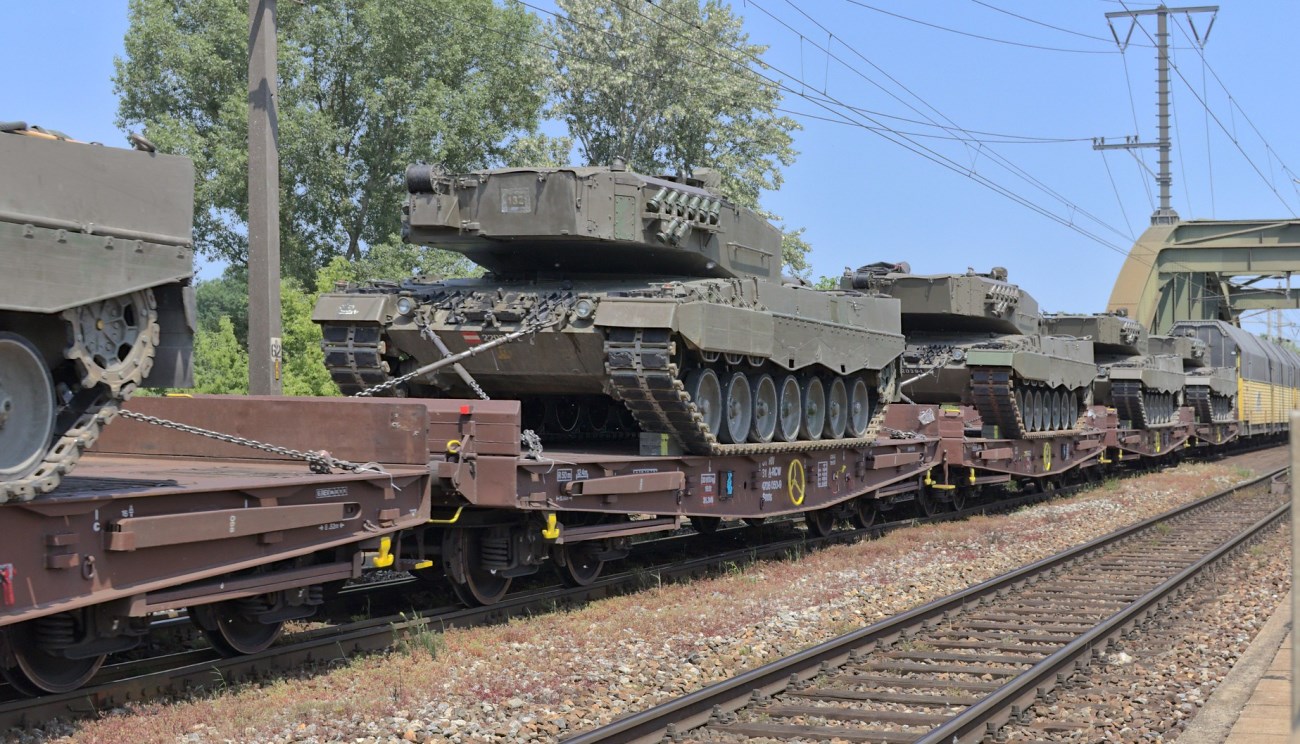NATO’s shortest summit reveals its deepest crisis

NATO just held its shortest summit in history. One page. 450 words.
Compare that to last year’s Washington Summit: 5,400 words covering everything from China’s rise to Africa’s instability, from cyber threats to Ukraine’s path toward membership. The Washington Declaration addressed strategic competition, Iran’s destabilizing actions, the deepening partnership between China, Russia, Iran and North Korea, and their mutual attempts to undercut the rules-based international order.
What happened to the other 5,000 words?
They disappeared because America and Europe no longer agree on what threatens them, who their enemies are, or what NATO should do about it. They no longer share values and principles. The Hague Declaration reads like a divorce settlement—the bare minimum both sides could stomach.
Member states agreed to spend 3.5% of GDP on defense by 2035 and count Ukraine aid as NATO spending. That’s it. No mention of Russia’s horrific, unjustified and unprovoked war against Ukraine. No plan for deterring future aggression. No roadmap for Ukrainian NATO membership.
Even more telling: the declaration omitted Russia’s ongoing hybrid war against NATO territory itself—the sabotage, assassinations, cyberattacks, forced displacement, human trafficking, and irregular migration that continue across Alliance borders without meaningful consequence.
The war Russia wages on NATO soil
Russian operatives sabotage critical infrastructure across Europe. They attempt assassinations on European soil. They launch cyberattacks on government networks. They disrupt navigation signals. They violate the airspace and territorial waters of NATO member states. They run disinformation campaigns targeting elections. They orchestrate forced displacement operations designed to destabilize European societies. Russia is waging a hybrid war on the territory of the Alliance.
Russian intelligence services target defense contractors, government officials, and civilian infrastructure. They do so with impunity because NATO cannot agree on a response.
None of this made it into NATO’s 450-word summary. Acknowledging Russia’s hybrid war would require a unified response. America and Europe cannot agree on what that response should be.
America pivots to Asia, Europe left behind
The silence reveals America’s strategic shift. President Trump wants Europe to handle Russia alone while helping America fight China. Project 2025 spells it out: “Beijing presents a challenge to American interests across the domains of national power, but the military threat that it poses is especially acute and significant.”
The document demands that “US allies must play their part not only in dealing with China, but also in dealing with threats from Russia, Iran, and North Korea.” It stresses that NATO must be transformed so that its “allies are capable of fielding the great majority of the conventional forces required to deter Russia while relying on the United States primarily for […] nuclear deterrent”, and other selected capabilities, while “reducing the US force posture in Europe”.
The US does not want to commit to fighting wars in Europe but seeks to commit Europe to fighting wars in the Indo-Pacific area.
But here’s the fundamental disconnect—Europe sees Russia as the primary threat launching an actual war on European soil. Trump sees Russia as a business opportunity. While Europe wants to destroy Russia’s war economy, Trump pursues economic cooperation with Moscow.
When Europe seeks justice and accountability for Russian war crimes, Trump blocks efforts to hold Putin responsible. His peace plan rewards Russian aggression while pressuring Ukraine to surrender territory. In the UN, America now sides with Russia, China and Belarus against European resolutions on Ukraine.
Trump’s positions and rhetoric have become increasingly aligned with Putin’s, especially on Ukraine, NATO, and international law. He rewards the aggressor while pressuring the victim.

NATO Summit with US participation recognises Russia as long-term threat to entire Alliance
The systematic dismantling of cooperation
Trump’s America First policy has systematically dismantled the cooperative framework that defined NATO for decades. Previous declarations emphasized international cooperation as key to enhancing stability and upholding international law. They addressed political dialogue and practical cooperation with partners based on mutual respect, benefit, and interest. NATO’s Open Door Policy was a key policy for years.
All gone.
Trump has withdrawn America from the World Health Organization, the Paris Agreement, the UN Human Rights Council, and the main UN relief agency for Palestinians. His executive orders call for reviewing American involvement in UNESCO and overall UN funding.
Beyond withdrawals, the administration has dismantled USAID—ending a strategic soft power tool that ensured global influence for decades and affected millions worldwide. It launched sanctions against the International Criminal Court, directly eroding international rule of law. It started trade wars against America’s closest allies while threatening land grabs in three different regions and suggesting ethnic cleansing in Gaza.
America now prefers bilateral deals over multilateral institutions and views international treaties as constraints on American interests. The US is setting international law aside in favor of “might makes right.”
The contempt runs deep
The European Union used to be singled out as a crucial partner in past declarations. The Washington Summit Declaration stressed that NATO would take concrete steps to deepen its cooperation with the EU.
Today, Trump’s team doesn’t hide its disdain for European allies who have fought alongside American forces in numerous operations. “It’s pathetic!” Defense Secretary Pete Hegseth blasted, referring to Europe’s dependence on American military power. Vice President JD Vance expressed huge disregard for allies, claiming Europeans haven’t “fought a war in 30 or 40 years” and calling the continent dysfunctional and dying.
Trump himself put it bluntly: “The European Union was formed in order to screw the United States.” He argues that all countries take advantage of America, but “in many cases, our allies are worse than our so-called enemies.” “The European Union has treated us so terribly,” he said.
Trump has long criticized allies for taking advantage of the US by under-spending on defense and “free-riding” on security provided by American superpower status.
Consider this stunning fact: Trump has threatened to occupy NATO territory by military force. Putin has never done that.
Ukraine’s vanishing NATO path
Last year’s Washington Summit explicitly supported Ukraine’s “irreversible path to full Euro-Atlantic integration, including NATO membership.” Those words have vanished from the 2025 declaration.
Trump has explicitly ruled out Ukrainian NATO membership. In his “final offer” peace plan presented in Paris, the administration promised Ukraine would never join the Alliance—a key Kremlin demand.
Some have argued that omitting Ukraine’s NATO path from the declaration is advantageous, claiming it preserves past commitments through silence. This is naive. The declaration reflects Trump’s policy. Past statements he disagrees with have been systematically deleted. The silence speaks louder than previous promises, and there are no indications Trump will change his position.
The dangerous math of denial
European Commissioner for Defence Andrius Kubilius reports that European intelligence agencies predict possible Russian attacks on Europe by 2030. Some analysts believe aggression could begin as soon as the next three years. Yet NATO just agreed to reach adequate defense spending by 2035—potentially 5-8 years after conflict begins.
This timeline gap undermines any remaining Alliance credibility. Russia already knows NATO won’t defend itself effectively. That’s why Moscow wages hybrid war across Alliance territory with impunity.
The ongoing sabotage, assassinations, and cyberattacks continue because Russia calculates that NATO lacks both will and unity to respond. Russia tests Alliance resolve and finds it wanting.
If America and Europe fundamentally disagree on threats, values, international law, and the purpose of alliances themselves, NATO isn’t an effective military alliance. If member states’ interests and concerns aren’t heard and accounted for, it’s not even an alliance.
The appeasement trap
European leaders chose appeasement at The Hague, giving in to Trump’s demands while fueling his ego. NATO Secretary General Mark Rutte’s deference to Trump may have secured this hollow declaration, but it solved nothing and demonstrated neither NATO unity nor credibility.
Trump walked out early from the G7 summit in Canada rather than meet with President Zelenskyy, allegedly due to his dislike for President Macron and lack of interest in Ukrainian concerns. A repeat of that G7 walkout might have been preferable to the hollow Hague Declaration.
Why do we insist on pretending that NATO is a credible Alliance when we clearly know it is not? Russian aggression demonstrates that it already knows it is not. Strategic denial helps no one.
The path forward
Bringing the discord out into the open would help create strategic clarity.
European leaders face a choice: continue the charade or acknowledge reality. If Europe and America only agree on 10% of what used to be shared strategic objectives, honest acknowledgement would enable essential discussions about European strategic autonomy and credible deterrence by decade’s end.
Europe can become a great power if it decides to. A Coalition of Like-Minded Countries could create genuine deterrence detached from an America that no longer shares European interests, values or threat assessments.
Ukraine is presently far more important to European security and stability than the United States. Ukraine fights Europe’s war while America pursues business opportunities with the aggressor. Europe should act accordingly.
European security cannot depend on the hope that America will help while America actively undermines European security by ending aid to Ukraine, including air defense and counter-drone missiles that protect both Ukraine and Europe. Denying Ukraine defense aid undermines security on the European continent. It puts allies in peril.
European security must be founded on credible European military capabilities and political unity, not wishful thinking about American reliability.
It’s time for Europe to stand up for its values and principles. If they run contrary to American foreign policy, say so. Take a stand. Appeasement only leaves autocrats hungry for more—but they respect strength.
The 450-word Hague Declaration tells the real story: The US and Europe have already divorced in all but name. NATO is no longer a credible defensive alliance. The question is whether Europe will acknowledge this reality and build something that works, or keep pretending the marriage functions while the house burns down around them.
Hans Petter Midttun
Editor’s note. The opinions expressed in our Opinion section belong to their authors. Euromaidan Press’ editorial team may or may not share them.
Submit an opinion to Euromaidan Press



